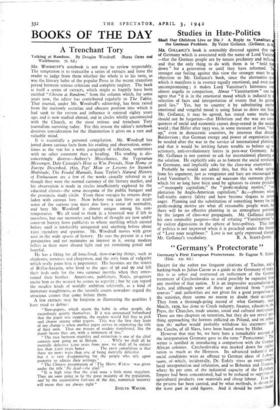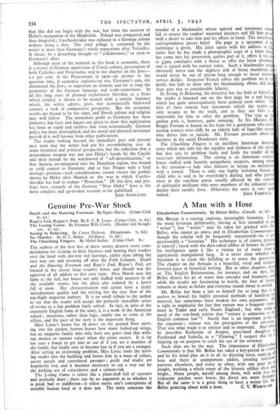"Germany's Protectorate "
Germany's First European Protectorate. By Eugene V. FAO. (Hale. us. 6c1.)
ExcErr for the rather too frequent citations of Tacitus, and i harking-back to Julius Caesar as a guide to the Germany of todaYi this is as sober and restrained an indictment of the German treatment of Czechoslovakia as could possibly be expected from any member of that nation. It is an impressive accumulation Cl facts, and although some .of these are derived from "private sources" and authorities are not given for a good proportion Cl the statistics, there seems no reason to doubt their accuracY. They form a thorough-going record of what Germany. sina March, 5939, has dohe to Czech industry, finance, education, the Press, the Churches, trade unions, social and cultural institutions. There are two chapters on terrorism, but they do not reveal anY- thing approaching the horrors inflicted on Poland, and on refla- tion thc author would probably withdraw his statement that the Czechs, of all Slays, have been hated most by Hitler. However that may be, we have here a remarkable account d the interpretation Germany gave to the term "Protectorate." The writer is justified in introducing a comparison with the German African colonies. Czechoslovakia was marked down for exploi- tation as much as the Herret os. Its advanced industrial and social conditions were an offence to German ideas of Lebens- raum, of•which, incidentally, Dr. Erdely gives an exceptionallf lucid interpretation and refutation, and so Bohemia and Moravia, where 80 per cent. of the industrial capacity of the Habsburg Empire had been concentrated, had to be reduced to supPlicrsrd agricultural products, raw materials and cheap labour. Ho* ,lar the process has been carried, and by what methods, is shown l°r, the most part in cold figures. And it should be remembeen5
that this did not begin with the war, but from the morrow of Hitler's occupation of the Hradschin. Poland was conquered and then despoiled ; Czechoslovakia was reduced to a German colony without firing a shot. The total pillage is estimated by the writer at more than Germany's whole reparations after Versailles. It shoule be a disturbing thought to "collaborators," or even to Germany's allies.
Although most of the material in this book is economic, there is a record of German oppression of Czech culture, persecution of both Catholics and Protestants, and in the chapter on the Jews- 1.1 per cent, of the Protectorate in 1939—an answer to the question .why, if economic exploitaiion was Germany's aim, she eliminated the Jews, so important an element and for so long the promoters of the German language and trade-connexions. In all this long story of planned exploitation Slovakia, as a State which yielded, is shown to be treated with a certain leniency which, the writer admits, gives that economically backward country a look of comparative prosperity. But the economic results are bound to be the same, and Slovak culture and religion may well follow. The immediate profit to Germany has been immense, but facts and figures are given to show that exploitation has been so rapid and ruthless that even economically German policy has been shortsighted, and the moral and physical resistance provok..d is well known from other publications.
The reader looking beyond the immediate past and present may wish that the writer had put his overwhelming case in some historical and political perspective, but the reflection that a tremendous weapon was put into Hitler's hands by the Czechs and their friends by the watchword of "self-determination," or that Austria, un-integrated into the Danubian region, was bound to yield control to Germany and so face Prague with a fatal strategic position—such considerations cannot excuse the perfidy shown by Hitler after Munich or the way in which Czecho- slovakia has had to endure "Protection." Of this first, and per- haps best, example of the German "New Order" here is the most complete and up-to-date account so far published.
JOHN STAPLETON.



























 Previous page
Previous page